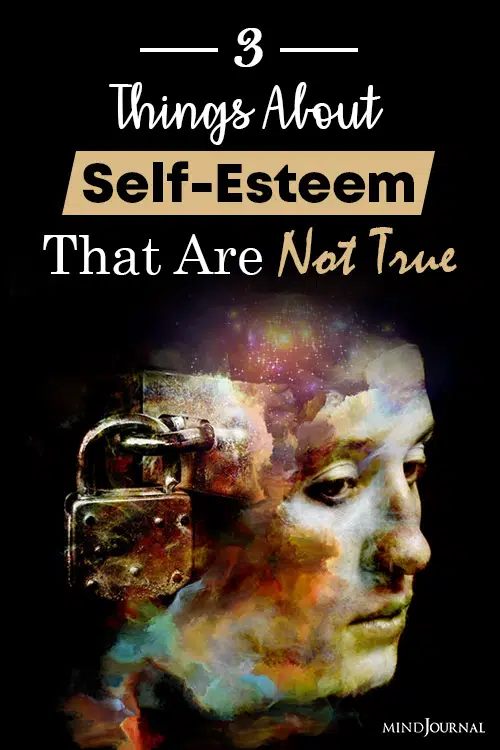Accepting yourself for who you are and believing in yourself is the ultimate way to live a fulfilling and content life. Self-esteem is what helps us to navigate our lives in a positive way. But do we really know what self-esteem really is? There are some factors we associate with self-esteem which are not true, contrary to popular belief.
There is hardly a shortage of advice out there on how to build unshakable confidence and start believing in yourself again. Self-esteem is a major celebrity in the field of psychology—in fact, it’s probably one of the most researched topics of all time.
We do need high self-esteem, though, so that we feel worthy and valuable human beings—that’s undebated by scientists, unlike the ways to go about getting to that sunshine state of mind or what outcomes our elevated self-beliefs can actually help us achieve.

But one thing is for sure, I believe—to be able to nurture and grow your self-views, you need to know not only the right paths to take that will lead to self-enhancement, but equally —the ones not to venture into.
Here Are 3 Things About Self-Esteem That I’ve Found Are Not True, Contrary To Somewhat Popular Beliefs.
1. Self-Esteem And Confidence Are The Same Thing
In fact, this is not quite correct. ‘Self-esteem’ comes from the Latin term ‘aestimare,’ which means ‘to appraise, value, weigh.’ ‘Confidence,’ in turn, derives from the word ‘fidere,’ or ‘to trust.’
Simply put, self-esteem is internal—it’s about how much you value yourself, what you believe your worth is. Confidence is the external projection of these inner feelings—it’s the outer expression of self-esteem.
Goes without saying, they are hitched—one can’t exist without the other. But, if you try to fake confidence without feeling it on the inside, a clash is imminent. This so-called ‘surface acting’ is mentally exhausting and you can’t keep up the act for long, many studies have uncovered. So, a better way to go about it is not to fake it, but feel it on the inside.
Yet, another view to describe the difference between the two terms is that self-esteem is your opinion of yourself, while confidence is how certain you are in these opinions, as Prof. Richard Petty nicely puts it in his Ted Talk.
Related: How To Boost Your Self-Esteem Quickly: 12 Simple Tips
2. Self-Esteem Is Stable And Can’t Be Changed
Self-views are largely established around the tender age of 5, research tells us, and are fairly consistent through our lifespans. But this is not the full picture.
On the whole, self-esteem is comprised of 3 main faucets—global (trait), state, and domain.
1. Global (trait) self-esteem
Global (trait) self-esteem is what we generally think about ourselves—it’s a barometer of how much we like or dislike ourselves if we think we are a worthy person. And these opinions are fairly stable, indeed.
2. State self-esteem, or feelings of self-worth
State self-esteem, or feelings of self-worth, relate to how we feel in the moment. For instance, getting a promotion may boost your self-esteem, while a divorce can plummet it. It’s the events that happen to us, that can affect whether we feel good or bad about ourselves. It’s self-implied that these opinions are temporary and can be flipped somewhat easily when the next success or failure comes around.
3. Domain self-esteem
Domain self-esteem means how much we evaluate our abilities and skills. For instance, you may be an excellent student, therefore— have high academic self-esteem, but maybe mediocre at sports, which puts your athletic self-esteem somewhere on the low end of the spectrum.
But here is the silver lining—not all domains are created equal. If you want to become a doctor, for instance, your self-esteem will be tied to academics and not athletics. So, the fact that you can’t run fast won’t dent your self-esteem.
Then it goes without saying—that by putting more effort and practice into the areas that matter to you, you can influence your self-esteem.
3. Positive Feedback And Affirmations Boost Self-Esteem
It’s a well-known fact that low esteemers are not great fans of compliments. In fact, accolades clash with their unfavorable self-views to the point that they consider them bogus, even if the praise is deserved. Lovely stuff, isn’t it?
But it gets more interesting. According to the so-called Self-verification theory, we tend to seek feedback from others that is coherent with our own self-opinions, even if they are negative. What this really means is that people with unflattering self-views prefer friends and partners who regard them negatively.
It may sound a bit absurd, but it does make sense.
Related: STOP Killing Your Self-Esteem: 5 Habits You Need To Change Now
If you don’t like yourself very much and someone tells you that you are a wonderful person, it will sound like a lie (even if true). It clashes with the way you perceive the world and yourself. Instead, you will seek validation that you are as you believe it to be—not nice and lovable.
Self-intervention won’t work either. Another piece of research tells us that positive self-affirmation (for ex. I’m worthy, I’ll be a great success, etc.) won’t do anything for someone with low self-esteem. In fact, they will ring as false and will make you feel inauthentic.
To successfully influence your self-esteem with affirmations, the Greats tell us, you need to base the praise on your actual strengths and abilities and focus on progress, not on the end result.
But ultimately, in order to become a recovering self-esteemer, you must learn to first accept yourself just as you are. ‘Unconditional positive regard’ is what can facilitate change and growth.
Or, as the great American psychologist Carl Rogers eloquently put it:
“The curious paradox is that when I accept myself as I am, then I can change.”
And so can you.
Written by: Evelyn Marinoff
Originally appeared on: Evelyn Marinoff
Republished with permission.
For more advice on how to become more confident and live a more fulfilling life, join Evelyn’s Facebook page here or visit her website http://www.evelynmarinoff.com/.










Leave a Reply
You must be logged in to post a comment.